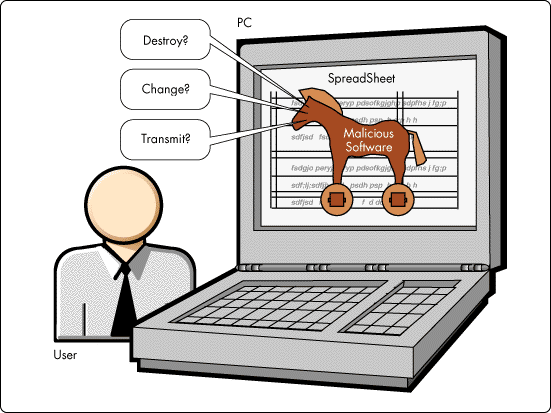rojan malware takes its name from the classical story of the Trojan horse, because it imitates the technique to infect computers. A Trojan will hide within seemingly harmless programs, or will try to trick you into installing it.
Trojans do not replicate by infecting other files or computers. Instead, they survive by going unnoticed. They may sit quietly in your computer, collecting information or setting up holes in your security, or they may just take over your computer and lock you out.
What do Trojans do?
Because Trojans are so versatile and can go unnoticed, their popularity has exploded until they've become the malware of choice for many online criminals.
Some of the more common actions that Trojans take are:
Creating backdoors: Trojans typically makes changes to your security system so that other malware or even a hacker can get in.
Spying: some Trojans are essentially Spyware designed to wait until you access your online accounts or enter your credit card details, and then send your passwords and other data back to their master.
Turn your computer into a Zombie! sometimes, a hacker isn't interested in you, but just wants to use your computer as a slave in a network under his or her control.
Send costly SMS messages: even smartphones get Trojans, and the most common way for criminals to make money is by using them to make your phone send costly SMS messages to premium numbers.
What does a Trojan look like?
Well, that’s just it: Trojans can look like just about anything. The computer game you downloaded from a strange website. The "free" MP3 song by that band you secretly like. Even an advertisement might try to install something on your computer.
Some Trojans are specifically designed to trick you into using them. They can use misleading language or try to convince you they are a legitimate app. Tricking you this way is called social engineering, because the criminals designed a situation to make you act against your interest.
How do I protect myself against Trojans?
Staying away from questionable sites, pirated materials, and dubious links may help, but in the long run something will get through.
If you truly want to stay protected, you need an anti-malware software like AVG AntiVirus FREE to stay protected.
Even security experts rely on some form of protection to keep them safe. So should you.
Hi! I am a robot. I just upvoted you! I found similar content that readers might be interested in:
https://www.avg.com/en/signal/what-is-a-trojan